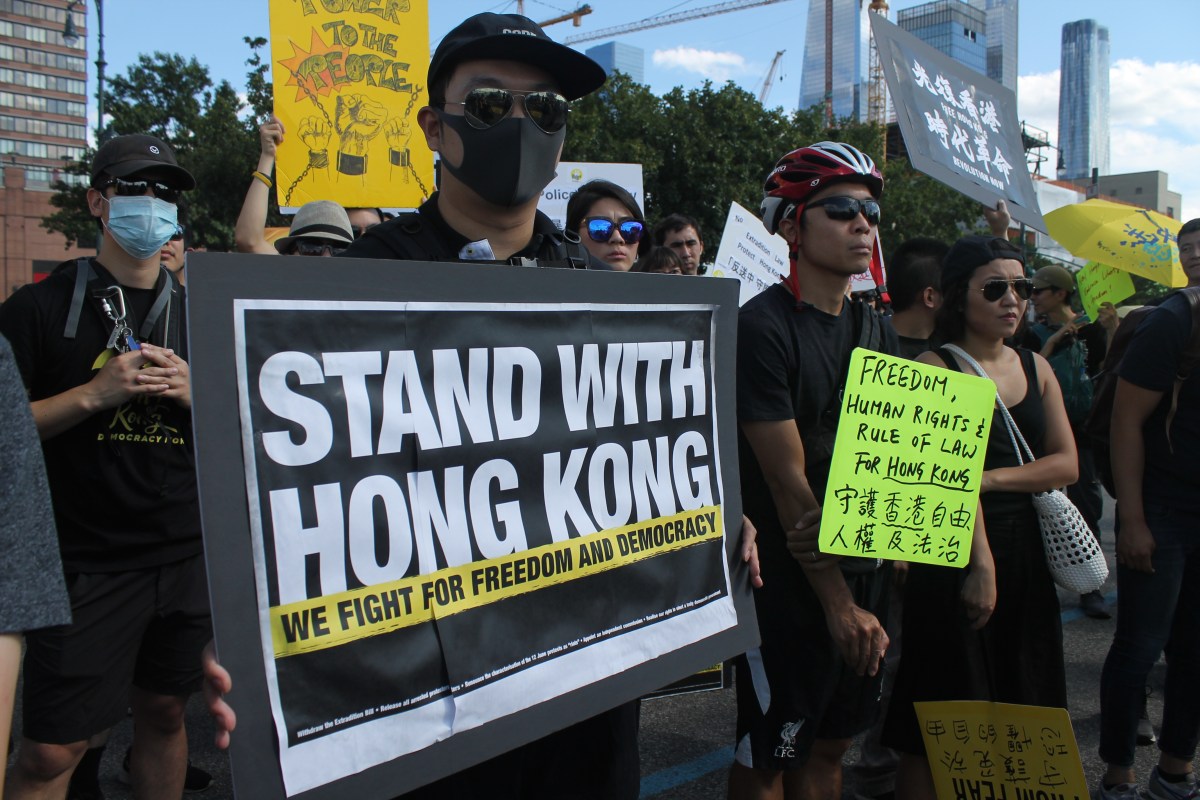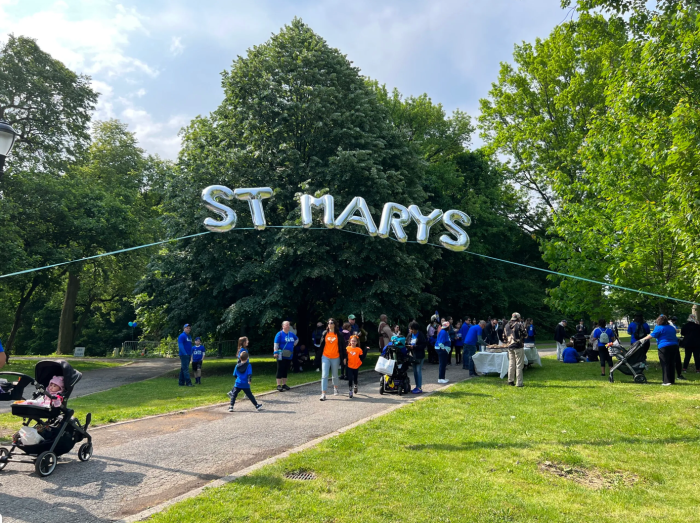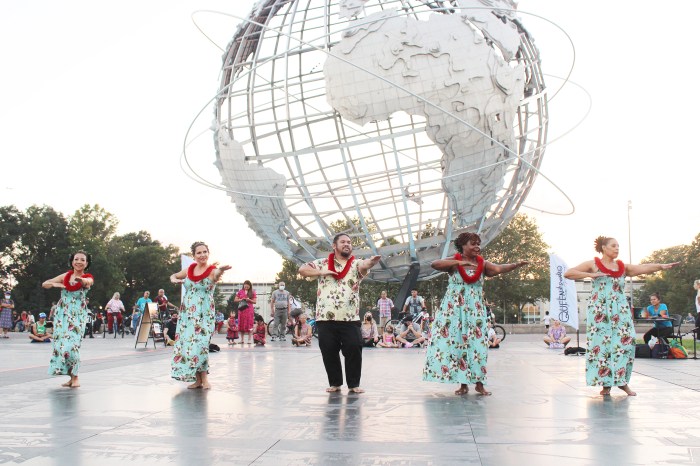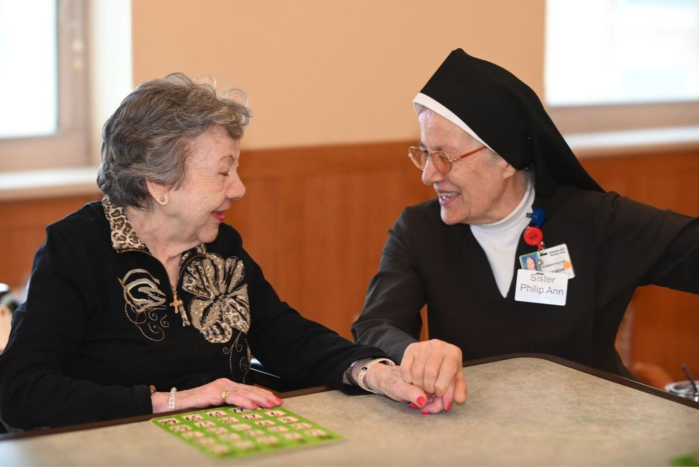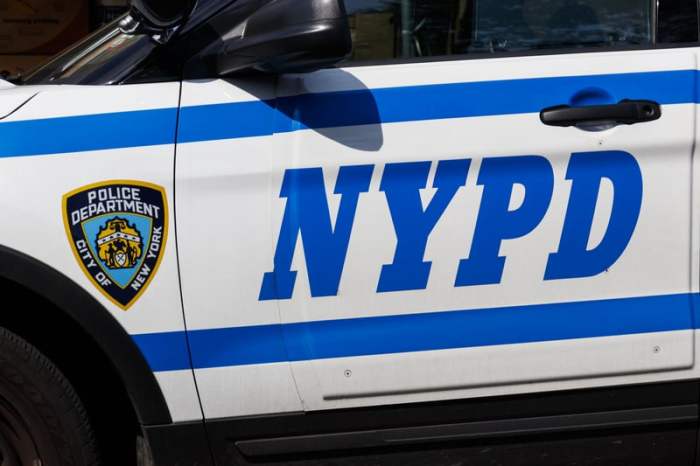As Hong Kong heads into its 10th week of mass political demonstrations calling for withdrawal of an extradition bill and wider democratic reform, activists and supporters in Queens and throughout New York City are standing in solidarity with protesters.
Over 100 protestors convened at Pier 81 at West 42nd Street and 12th Avenue in Manhattan on Aug. 10, across the street from the Chinese Consulate, voicing their opposition against the extradition bill, which would extend the power of mainland authorities in China to extradite individuals who are wanted in territories with which the mostly autonomous Hong Kong government does not have extradition agreements.
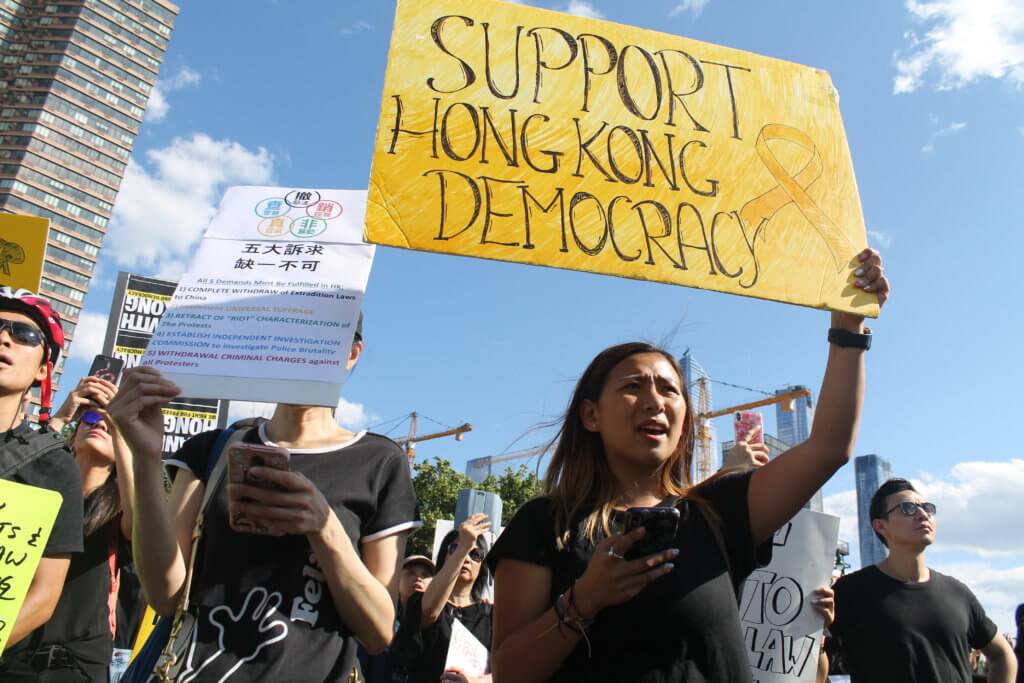
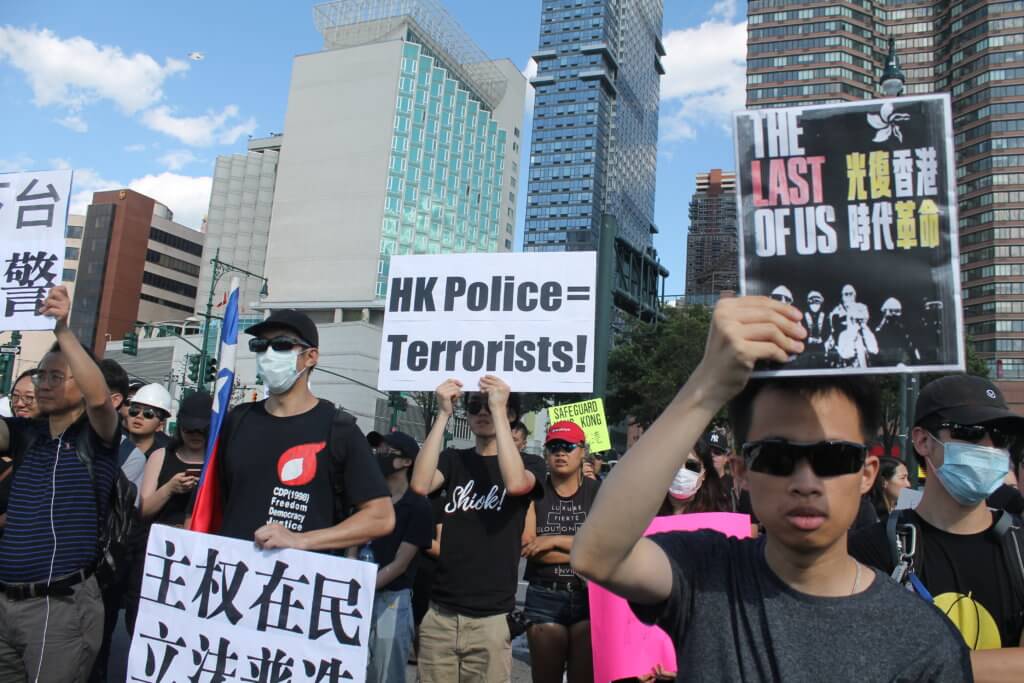
If the bill is passed, it would bring Hong Kong closer under China’s control — where the justice system has a record of torture, serious violations of fair trial rights, enforced disappearances and various systems of incommunicado detention without trial, according to human rights organization Amnesty International.
As a result, on June 9, over a million people took to the streets in Hong Kong protesting the government’s refusal to withdraw the bill, which has led to the arrests of over 600 people and excessive police violence, according to activist Anna Cheung, founder of NY4HK (New Yorkers Supporting Hong Kong), an organization formed in September 2015 in support of the democracy movement in Hong Kong.
Though Hong Kong’s Chief Executive Leader, Carrie Lam, shelved the bill in mid-June, demonstrators are calling for her resignation and wider demands for democratic reform in the city.
“It is pretty bad and right now as we are speaking, they’re protesting at the Hong Kong International Airport,” Cheung told QNS in a phone interview after returning from Hong Kong. “It’s very emotional. It’s different when I’m here hosting a rally to support them. People are working together and there are thousands of people on the street, especially the youngsters. When I go to the assembly, you cannot even get through. The people are peaceful and polite.”
The Hong Kong International Airport returned to normal operations on Aug. 14 following clashes between protesters and police, CNN reported. Almost 200 flights to and from Hong Kong Monday had been canceled as thousands of protesters shut down the airport.
Cheung, an activist for 25 years, was joined by outspoken critics at the NY4HK Manhattan rally giving members and outside supporters a platform to voice their concerns on the erupting protests in Hong Kong.
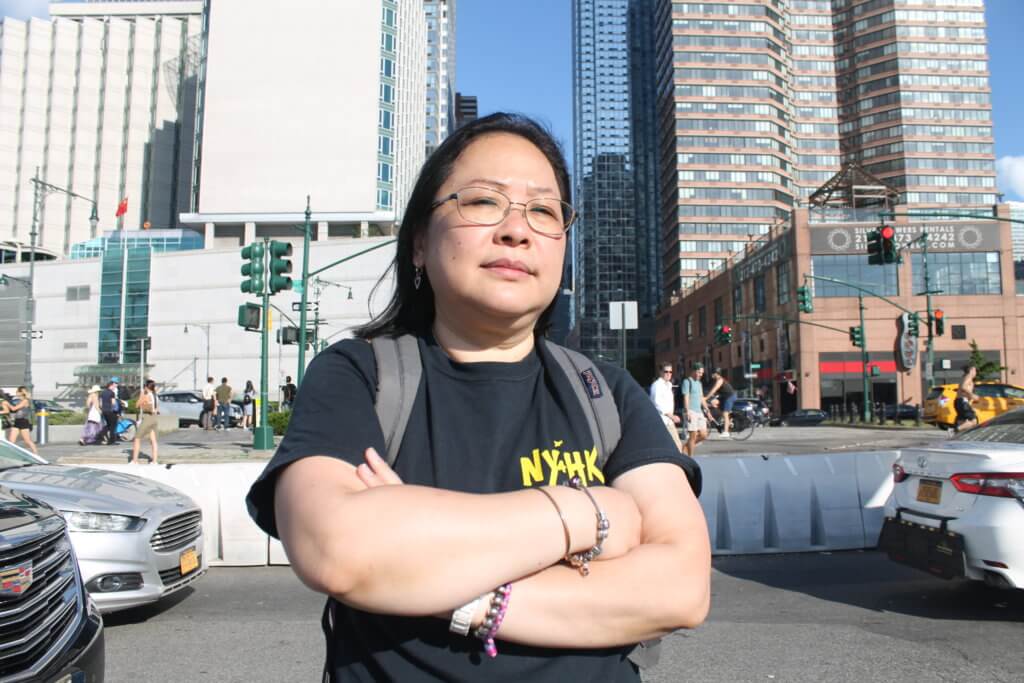
(Photo by Alejandra O’Connell-Domenech)
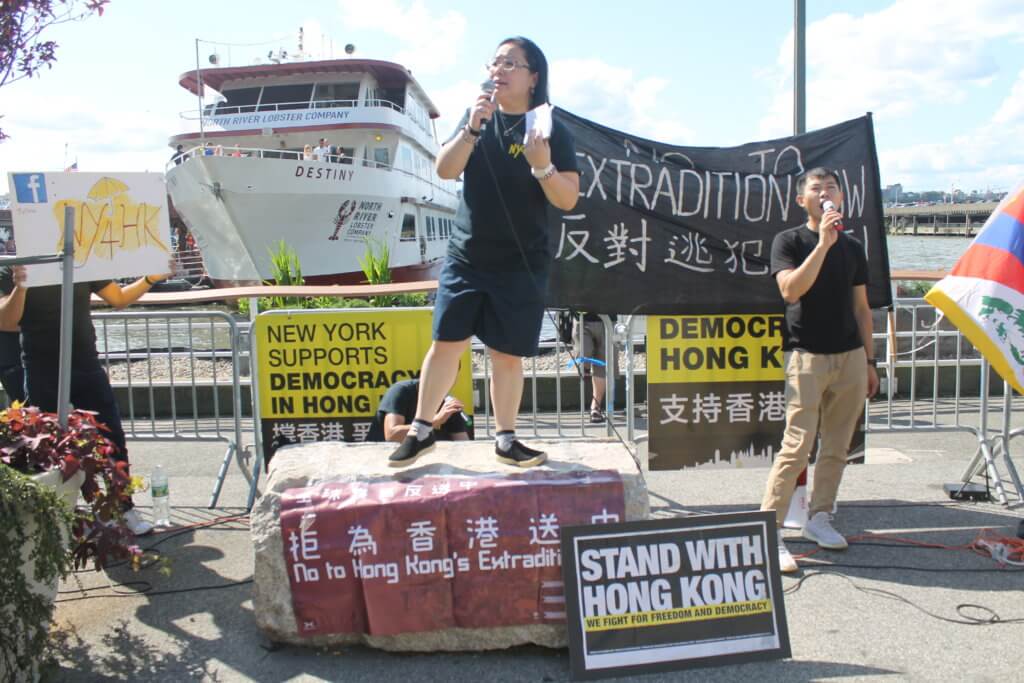
“They’ve been watching this every day … some of them immigrated here or came to study so they feel they want to at least chant with me … they get excited and sing the songs,” Cheung said. “They want to be a part of it and show their support.”
Queens connections to Hong Kong protest
Hundreds of volunteers across the city have joined the movement — including two Queens residents, who used to live in Hong Kong. They expressed their sentiments to QNS in a phone interview about the violent clash between the riot police and protesters.
Born and raised in Hong Kong for 14 years prior to moving to San Francisco and then New York City to continue her academic studies, Yvonne Chen, 29, of Fresh Meadows, said she began paying more attention to the living conditions, politics and news in Hong Kong.
“It changes every time I go back,” said Chen, who visits the city one to two times a year. “Protests happened every year in Hong Kong since 1997 and that’s because we are given the right to do so. Sadly, the Hong Kong government never listens to our voices, even though all of the protests from the past were very peaceful.”
Chen joined NY4HK in 2014 when the political Umbrella Movement in Hong Kong gained momentum during pro-democracy protests in September 2014. It prompted her to return to Hong Kong that year, she said.
“The main purpose of the Umbrella Movement was universal suffrage,” Chen said. “The entire government system was corrupt because it was handpicked by the Chinese government, and then it moved to different areas in Hong Kong because the government didn’t respond to our requests and just let us be.”
Why they protest
Hong Kong — a special administrative region of the People’s Republic of China, with a population of over 7.4 million people of various nationalities — was a British colony for more than 150 years. Part of it, Hong Kong Island, was ceded to the United Kingdom after the first Opium War in 1842. Later, China also leased the rest of Hong Kong — the new territories — to the British for 99 years.
Sovereignty over the territory was transferred to China in 1997, under the principle of “one country, two systems,” with its own mini-constitution, the Basic Law. Following the agreement between the UK and China, Hong Kong gained autonomy, except in foreign and defense affairs, for the next 50 years.
Under the constitution, Hong Kong has its own legal system and borders, and rights including freedom of assembly and free speech, which are protected. Other rights include “no arbitrary or unlawful arrest, detention or imprisonment; torture of any resident or arbitrary or unlawful deprivation of the life of any residents shall be prohibited.”
Demonstrators have listed their five key demands: Withdrawal of the extradition bill; retraction of the proclamation protests on June 9 and June 12; a withdrawal of criminal charges against all protestors; a thorough investigation of abuse of powers by the police; and dissolution of the legislative council by administrative order; and an immediate implementation of Dual Universal Suffrage.
Fighting a ‘puppet regime’
According to Chen, a lot of people may see the movement as anti-China or even Hong Kong seeking independence, which she says, is a yes and no question.
“We are just fighting for what Beijing promised in the joint declaration,” Chen said. “Every night, every time I watch this live news in Hong Kong time overnight and I have to go to work and school the next day, I have to pretend nothing happened. It affects me a lot. You just really want to go back and help, but you can’t go because you’re trying to find other ways and sources to help those people out, but you’re not there and that still hurts me a lot. Some of my friends and family members in Hong Kong, either they don’t care or are pro-police. They can’t see what’s right or wrong.”
Chandelier Loo, 30, of Bayside, said the protests have affected her mentally by realizing that the judicial system is totally broken.
“Most of us believe that Carrie Lam, the Hong Kong chief executive, has been controlled like a puppet by the Beijing government,” Loo said. “Hong Kong is still running under the “one-country, two-system” policy and what’s happening in the recent days has exposed the truth that the Beijing government has once again lied to the world: there is no such thing.”
Upon her trip to Hong Kong in July, Loo witnessed protesting in Sha Tin, Central, Yuen Long and Causeway Bay, where police officers arrested people who weren’t conducting illegal activity, she said.
“Young people were trying to assist people with asthma exacerbation from tear gas exposure, efficiently set up barricades to safeguard front line medical staff. Pity-looking homemade styrofoam shields and swimming boards were used as defensive measures by those in the front line who are prepared and feared of being harmed by police,” Loo said. “The Hong Kong Police were protecting and letting ‘white-shirted’ gangsters leave after they abused by-passers, and telling protesters to leave the site and arresting those who were trying to leave.”
For Loo, joining NY4HK gave her an opportunity to help fellow Hong Kongers even though she is not able to be by their side, she said.
“Looking back to the Umbrella Revolution in 2014, my desire to fight for democracy in Hong Kong has not changed; the only difference is that my feelings of powerlessness has increased over time as my body is in the USA and my spirit in Hong Kong,” Loo said. “This movement is also affecting the economy in the U.S. because Hong Kong is basically used as a bargaining chip between China and the U.S.’s trade war. If Hong Kong’s financial status goes down, so does the world because Hong Kong is a major financial hub of Asia.”
Loo added, “There is a popular saying in the internet forum from the young Hong Kong population to the Chinese government, ‘If we burn, you burn with us; and if you burn, you burn.”

